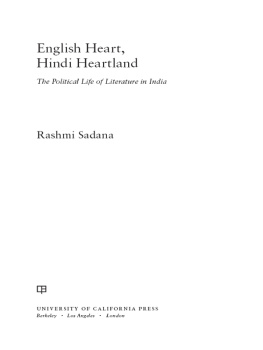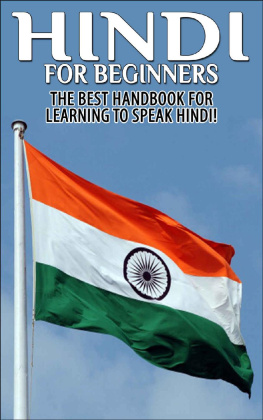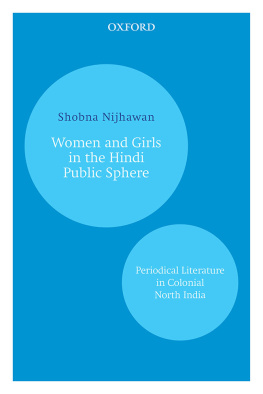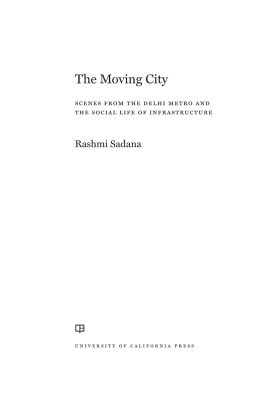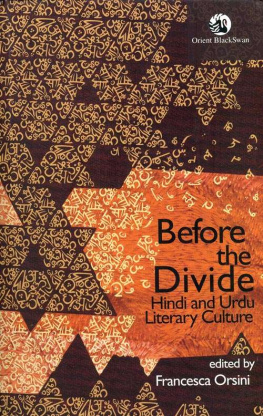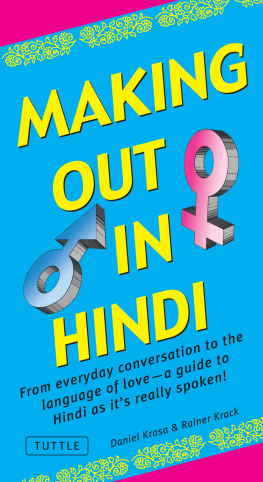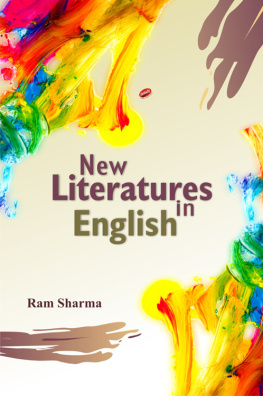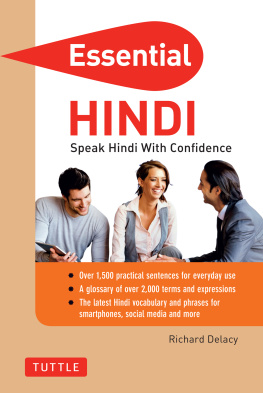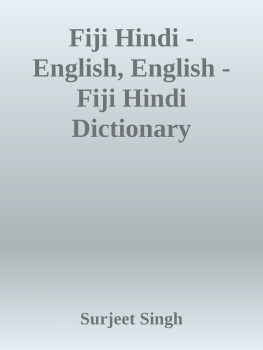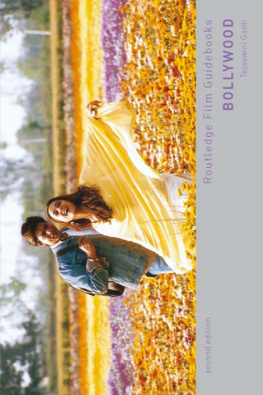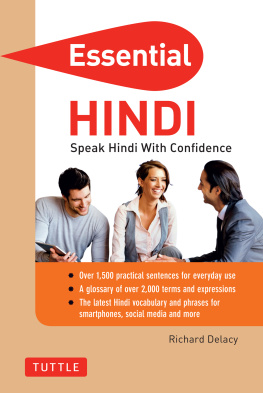Acknowledgments
This book is about the politics of language in India's literary field. Several key figures in that fieldthe publisher Ravi Dayal, the writer Nirmal Verma, the literary scholar Meenakshi Mukherjeepassed away before it was published. I am grateful to them and to all those represented in these pages who shared their experiences and insights with
The support for the original research for this book came from Foreign Language and Area Studies fellowships, a Society of Women Geographers' Fellowship, a Robert E. Lowie Grant, and two Humanities Research Grants from the University of California, Berkeley, where I was a graduate student in anthropology. Lawrence Cohen, my advisor at Berkeley, has been with this project from beginning to end, and his support, in too many ways to recount, has been tremendous. Vasudha Dalmia has been a true mentor to me, and I must have consulted her on every aspect of this book and its publication. I can't thank her enough. At Berkeley, I was also inspired and challenged by Stefania Pandolfo, Aihwa Ong, Raka Ray, Gene Irschick, Tom Metcalf, Sharon Kaufman, Michael Watts, Trinh Minh Ha, and Usha Jain. I first began to form some of the intellectual questions I had about Indian modernity when I took Sudipta Kaviraj's politics seminar at the School of Oriental and African Studies, and I was fortunate to be able to study with him again when he came to Berkeley as a visiting scholar. It was my good luck that Ram Guha was also a visiting scholar around this time and taught a brilliant course on Gandhi.
The period of revision and further research was made possible when I was a National Science Foundation-funded postdoctoral fellow at Columbia University, in the Department of Anthropology, from 2003 to 2006, and then by a second postdoctoral fellowship in the Committee on Global Thought in 2006-7. I thank Nick Dirks, Sherry Ortner, Brink Messick, Kate Wittenberg, Partha Chatterjee, and Akeel Bilgrami for providing the intellectual support and institutional space that made my time there so productive and enjoyable. In New York, I was also fortunate to receive encouragement and valuable feedback for this project from Robert Young and Rajeswari Sunder Rajan.
My revisions were helped along with the excellent comments I received from audiences when I was invited to present work at the Mellon Humanities Workshop at Stanford University, the South Asia Colloquium in Anthropology at Yale University, the Department of English at New York University, the Departments of History and Asian Languages and Cultures at the University of Michigan at Ann Arbor, the Department of Anthropology at the London School of Economics, the Women's Studies Programme at Jawaharlal Nehru University, the Centre for Contemporary Theory in Baroda, and at Sarai / the Centre for the Study of Developing Societies in Delhi.
Teaching in India for the past two years has been a wonderful experience and has deepened my understanding of the issues of place and language that are central to this book. I thank my students, as well as V. R. Muraleedharan and Chella Rajan of the Indian Institute of Technology (IIT) Madras and Amrit Srinivasan of IIT Delhi for making it possible. The Sahitya Akademi was one of my research sites, but it also became a place where I sat and wrote. I thank the staff of the library there and especially S. Padmanabham.
I feel lucky to be part of the FlashPoints series and am grateful to the editorial board for its enthusiastic support of the manuscript from the start. Special thanks go to Ali Behdad of FlashPoints and Lynne Withey of UC Press for expertly shepherding the manuscript through. I also thank my two anonymous reviewers for their excellent suggestions for revision. I was thrilled to have Rukun Advani on board as the publisher of the book in India, and credit goes to him for coming up with the book's title. Portions of this book originally appeared in earlier versions in the following journals: Two Tales of the City: The Place of English and the Limits of Postcolonial Critique, in Interventions; and A Suitable Text for a Vegetarian Audience: Questions of Authenticity and the Politics of Translation, in Public Culture.
The continual support of family and friends has strengthened and, in many cases, made possible this work. I thank Promilla Mathur, Veena Naregal, Sunila and Pramod Sharma, Sonia Palitana, Raj and Indra Chugh and families, who over the years in their respective homes created a base for me in Delhi, Mumbai, and Pune, one that was then happily fortified by Harini Narayanan, Gautam Mody, and Alli Roshini in Delhi and Padma and R. I. Narayanan in Chennai. Veena Sadana, Suren Sadana, Ritu Sadana, Jacques Bury, Jacques-Kabir Bury, and Gitanjali Bury have given unstinting support everywhere and through it all. Meanwhile, Ambika delights as we anticipate which language her first words will be in.
My co-conspirators, Falu Bakrania, Ritu Birla, Diana Blank, Anindita Chakrabarty, Batya Elul, Ilana Feldman, Paul Frymer, Rachel Heiman, Poonam Joshi, Mani Lambert, Scott Morrison, Gustav Peebles, Renee Rubin Ross, Neil Safier, Shalini Satkunandanan, Miriam Ticktin, and Ananya Vajpeyi read drafts, showed by example, and much else; Vivek Narayanan did all the above and brought the essential perspective that had been missing for too long.
Bibliography
Achebe, Chinua. Morning Yet on Creation Day. New York: Anchor Press/Doubleday, 1975.
Adiga, Aravind. The White Tiger. New Delhi: HarperCollins, 2008.
Advani, Rukun, ed. Written for Ever: The Best of Civil Lines. New Delhi: Penguin Books and Ravi Dayal, 2009.
Ahmad, Aijaz. In Theory: Nations, Classes, Literatures. London: Verso, 1992.
. Lineages of the Present. New Delhi: Tulika, 1996.
Ahmed, Ali. Twilight in Delhi. New York: New Directions, 1994.
Altbach, Philip G. Publishing in the Third World: Issues and Trends for the 21st Century. In Publishing and Development in the Third World, edited by Philip G. Altbach. New Delhi: Vistaar Publications, 1992.
Ambedkar, Bhimrao Ramji. Thoughts on Linguistic States. Aligarh, U.P.: Anand Sahitya Sadan, 1989. First pub. 1955.
Amin, Shahid, and Alok Rai. A Debate between Alok Rai and Shahid Amin Regarding Hindi, edited by Palash Krishna Mehrotra. Annual of Urdu Studies 20 (2005).
Anand, S. Lighting Out for the Territory: The Arduous Journey of Modern Dalit Literature. Caravan 3, no. 2 (February 2011).
, ed. Touchable Tales: Publishing and Reading Dalit Literature. Pondicherry: Navayana, 2003.
Ananthamurthy, U.R. U.R. Ananthamurthy Omnibus. Edited by N. Manu Chakravarthy. Gurgaon: Arvind Kumar Publishers, 2008.
Anderson, Benedict. Imagined Communities: Reflections on the Origin and Spread of Nationalism. London: Verso, 1991.
. Language and Power: Exploring Political Cultures in Indonesia. Ithaca, NY: Cornell University Press, 1990.
Appadurai, Arjun. Modernity at Large: Cultural Dimensions of Globalization. Minneapolis: University of Minnesota Press, 1996.
Appadurai, Arjun, and Carol Breckenridge. Public Modernity in India. In Consuming Modernity: Public Culture in a South Asian World, edited by Carol Breckenridge. Minneapolis: University of Minnesota Press, 1995.
Apter, Emily. The Translation Zone: A New Comparative Literature. Prince-ton: Princeton University Press, 2006.
Ashcroft, Bill, Gareth Griffiths, and Helen Tiffin. The Empire Writes Back: Theory and Practice in Post-Colonial Literatures. London: Routledge, 1989.
Azim, Firdous. The Colonial Rise of the Novel. London: Routledge, 1993.
Bakhtin, M. M. The Dialogic Imagination: Four Essays. Translated by Caryl Emerson and Michael Holquist. Edited by Michael Holquist. Austin: University of Texas Press, 1981.
Next page
